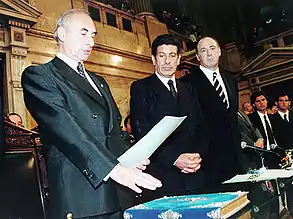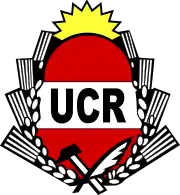Alliance for Work, Justice and Education
The Alliance for Work, Justice and Education (in Spanish: Alianza para el Trabajo, la Justicia y la Educación) was a center-left political coalition in Argentina around the turn of the third millennium. It was born of the alliance of the Radical Civic Union (UCR), the Front for a Country in Solidarity (FrePaSo), and a number of smaller provincial parties, in 1997.

Alliance for Work, Justice and Education Alianza para el Trabajo, la Justicia y la Educación | |
|---|---|
| Abbreviation | Alianza |
| Leader | Fernando De la Rua |
| Founded | 4 August 1997 |
| Dissolved | 20 December 2001 |
| Merger of | Radical Civic Union, FREPASO |
| Headquarters | Buenos Aires |
| Ideology | Radicalism Reformism Social liberalism Social democracy |
| Political position | Center-left |
| Colours | Light blue |
The Alliance presented itself as a progressive, moderate center-left alternative to the neoliberal government of Carlos Menem, with a mandate to end corruption and unemployment. It first took part in the 1997 legislative elections. In the 1999 elections it took Fernando de la Rúa (UCR) to the presidency, together with Carlos Álvarez as his vice president, defeating the Justicialist Party.[1]
However, De la Rúa soon revealed himself as unable or unwilling to tackle corruption and to revive the Argentine economy, which was in a recession, with innovative measures. In 2000, amid a scandal caused by accusations of bribery involving UCR senators and members of the cabinet, Álvarez resigned from the vice presidency, gravely hurting the unity of the Alliance. The socio-economic situation worsened, and De la Rúa was forced to resign by the December 2001 riots. The Alliance soon disintegrated, its members returning to their former parties or finding new ones.
References
- Daniel K. Lewis (15 October 2003). The History of Argentina. Palgrave Macmillan. pp. 179–181. ISBN 978-1-4039-6254-6.
